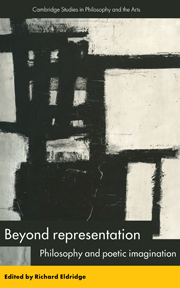Book contents
- Frontmatter
- Contents
- List of contributors
- Editor's acknowledgments
- 1 Introduction: from representation to poiesis
- 2 Confession and forgiveness: Hegel's poetics of action
- 3 The values of articulation: aesthetics after the aesthetic ideology
- 4 In their own voice: philosophical writing and actual experience
- 5 Poetry and truth-conditions
- 6 Fractal contours: chaos and system in the Romantic fragment
- 7 The mind's horizon
- 8 Kant, Hölderlin, and the experience of longing
- 9 Wordsworth and the reception of poetry
- 10 Self-consciousness, social guilt, and Romantic poetry: Coleridge's Ancient Mariner and Wordsworth's Old Pedlar
- 11 Her blood and his mirror: Mary Coleridge, Luce Irigaray, and the female self
- 12 Scene: an exchange of letters
- Index
2 - Confession and forgiveness: Hegel's poetics of action
Published online by Cambridge University Press: 06 July 2010
- Frontmatter
- Contents
- List of contributors
- Editor's acknowledgments
- 1 Introduction: from representation to poiesis
- 2 Confession and forgiveness: Hegel's poetics of action
- 3 The values of articulation: aesthetics after the aesthetic ideology
- 4 In their own voice: philosophical writing and actual experience
- 5 Poetry and truth-conditions
- 6 Fractal contours: chaos and system in the Romantic fragment
- 7 The mind's horizon
- 8 Kant, Hölderlin, and the experience of longing
- 9 Wordsworth and the reception of poetry
- 10 Self-consciousness, social guilt, and Romantic poetry: Coleridge's Ancient Mariner and Wordsworth's Old Pedlar
- 11 Her blood and his mirror: Mary Coleridge, Luce Irigaray, and the female self
- 12 Scene: an exchange of letters
- Index
Summary
CONSCIENCE: BETWEEN IRONY AND LIBERAL COMMUNITY
In writing a “phenomenology” portraying the fundamental forms or shapes of human consciousness, tracing them through their internal struggles and eventual self-generated dissolutions, Hegel must be construed as intending his philosophy to depart from the foundational, deductive, and naturalistic ambitions that constitute modern philosophy. Only through “experience” (Erfahrung) (86) that is, through the self-induced transformations of historically and socially mediated forms of consciousness, is philosophical insight possible. Yet, because he calls the knowing that results from this history of consciousness “Absolute,” and because he goes on to provide us with a “logic,” it has been almost universally supposed that his poetics of spirit (Geist), his account of the creative self-overcomings of consciousness, its “way of despair” (77), is only a “ladder” (26) to the standpoint of the Absolute which is to be cast away once it has been achieved; and with that achievement Hegel's philosophy, however circuitously, however deferred in approach, rejoins the tradition of subsumptive rationalism his phenomenological practice had bracketed. The phenomenological analysis of the modern conscientious self decisively challenges the thesis that with Spirit's coming to be acknowledged as Absolute we could cease having experiences and our exposure to despair be overcome.
Conscience is the third and final self in the history of Spirit through which it comes to awareness of itself as the ground and condition of human experience. Whatever Hegel means by his notions of Spirit and Absolute is hence to be revealed by how the self of conscience comes to understand itself.
- Type
- Chapter
- Information
- Beyond RepresentationPhilosophy and Poetic Imagination, pp. 34 - 65Publisher: Cambridge University PressPrint publication year: 1996
- 11
- Cited by



